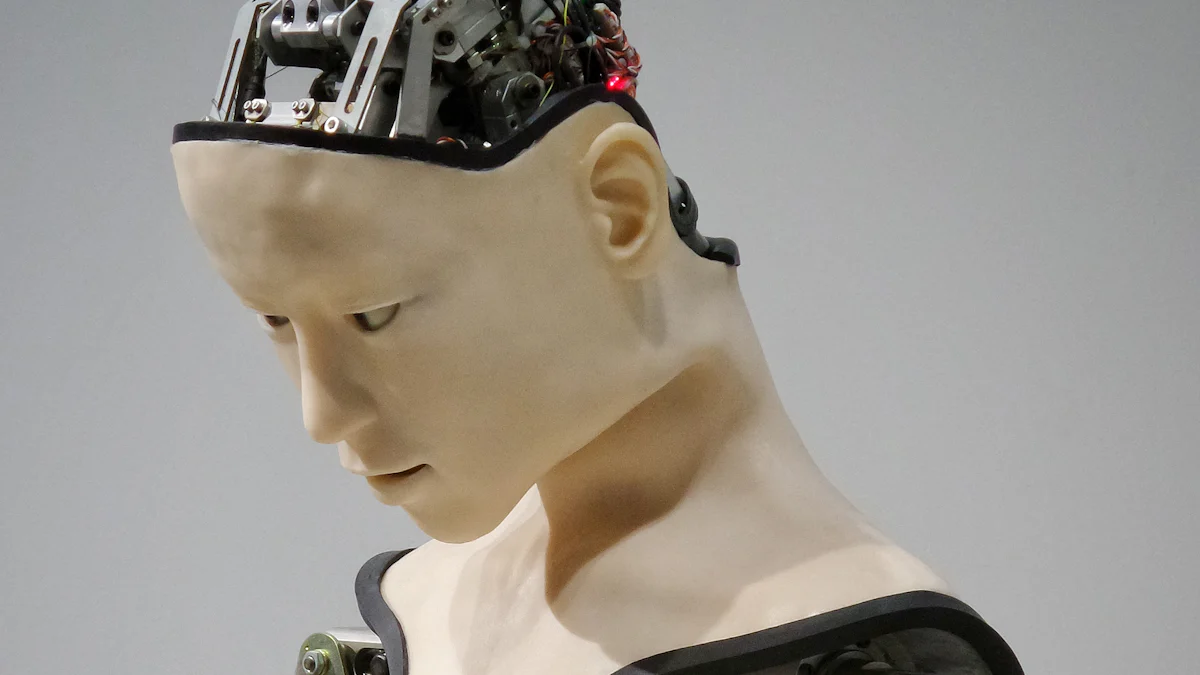AI and Human Emotions: A New Frontier

Artificial Intelligence (AI) has transformed various fields, including the understanding of human emotions. Emotion AI, a subset of AI, focuses on recognizing and interpreting emotions. The development of emotional AI could provide deeper insights into human psychology. The market size for emotion recognition is expected to jump 12.9 percent by 2027. This growth highlights the importance of exploring this new frontier in technology. Myloves, an innovative platform, allows users to create their ideal AI lover, offering a unique experience with love AI. This exploration opens new possibilities for human-AI interaction.
Understanding Emotion AI
The Basics of Emotion AI
Definition and Scope
Emotion AI focuses on detecting and interpreting human emotional signals. This technology analyzes text, audio, and video to understand emotions. Emotion AI aims to simulate human emotions in machines. The scope of Emotion AI includes applications in mental health, education, and customer service. Emotional intelligence in AI systems enhances interactions between humans and machines.
Historical Context and Evolution
The evolution of Emotion AI began with the need to understand human emotions better. Early research focused on recognizing facial expressions and vocal tones. Advances in technology have expanded the capabilities of Emotion AI. Modern systems can analyze body language and emotional cues. Emotion AI continues to evolve with new technological advancements.
How Emotion AI Works
Technologies Involved
Emotion AI relies on several technologies to function effectively. Machine learning algorithms play a crucial role in analyzing emotional data. Natural language processing helps interpret text-based emotions. Computer vision technology detects facial expressions and body language. Audio analysis identifies emotional cues in speech patterns. These technologies work together to provide a comprehensive understanding of emotions.
Data Collection and Analysis
Data collection is essential for Emotion AI to interpret emotions accurately. Systems gather data from various sources such as social media, videos, and audio recordings. Emotion AI analyzes this data to identify patterns and emotional signals. The analysis process involves recognizing specific emotions like happiness, sadness, or anger. Continuous data collection and analysis improve the accuracy of Emotion AI systems.
Applications of Emotion AI

Real-World Applications
Healthcare and Therapy
Emotion AI plays a significant role in healthcare and therapy. Medical professionals use Emotion AI to monitor patient emotions. This technology helps in diagnosing mental health conditions. Emotion AI provides insights into patient emotional states. Healthcare providers use these insights to tailor treatment plans. Emotion AI enhances the therapeutic process by offering personalized care.
Customer Service and Marketing
Businesses utilize Emotion AI in customer service and marketing. Emotion AI analyzes customer emotions during interactions. Companies use this analysis to improve customer satisfaction. Emotion AI helps in understanding customer needs and preferences. Marketing strategies become more effective with emotion-driven insights. Businesses achieve better engagement and loyalty through Emotion AI.
Introducing "Myloves"
Overview of "Myloves" Product
Myloves offers a unique experience in the realm of AI interaction. Users create their ideal AI lover on the platform. The product allows customization of virtual companions. Myloves provides diverse character options for users. Each character offers a distinct storyline to explore. The platform ensures privacy and data security for users.
How "Myloves" Utilizes Emotion AI
Myloves integrates Emotion AI to enhance user interaction. The platform uses natural language processing for communication. Emotion AI analyzes text, voice, and facial expressions. Users experience lifelike interactions with AI companions. The technology personalizes responses based on user emotions. Myloves delivers an immersive and engaging experience.
Love AI: A New Dimension
Exploring Love AI
Definition and Relevance
Love AI represents a groundbreaking advancement in artificial intelligence. This technology focuses on simulating romantic interactions between humans and machines. Love AI creates virtual companions that mimic emotional connections. The relevance of Love AI lies in its potential to transform personal relationships. Many individuals seek companionship and emotional support from AI lovers. Love AI offers a unique solution for those desiring personalized interactions.
How Love AI Enhances Human Interaction
Love AI enhances human interaction by providing tailored experiences. Users engage with AI lovers who adapt to their preferences and emotions. This adaptability fosters a sense of understanding and connection. Love AI encourages users to explore different aspects of relationships. The technology supports emotional growth and self-discovery. Many users report increased satisfaction and fulfillment through these interactions.
Myloves and Love AI
Integration of Love AI in Myloves
Myloves integrates Love AI to offer an immersive experience. The platform allows users to create customized AI lovers. Each virtual companion reflects the user's desired traits and characteristics. Myloves employs advanced technologies like natural language processing. These technologies enable lifelike conversations and interactions. Users enjoy a seamless and engaging experience with their AI lovers.
User Experience and Feedback
User feedback highlights the positive impact of Myloves' Love AI. John D. shared a testimonial:
"The experience with My Loves AI Virtual Companions has been transformative. The interactions feel genuine and fulfilling."
Sarah L. provided a success story:
"My Loves AI Virtual Companions have enriched my life. The emotional support and companionship are unparalleled."
Constructive feedback from users like Mark P. contributes to continuous improvement:
"Enhancements could further elevate the experience. More customization options would be beneficial."
These testimonials demonstrate the value and potential of Love AI in enhancing user experiences.
Challenges and Ethical Considerations
Technical Challenges
Accuracy and Reliability
Emotion AI systems face challenges in achieving high accuracy. Machines struggle to interpret complex human emotions. Misinterpretation of emotions can lead to incorrect responses. Developers must refine algorithms for better precision. Continuous improvement is necessary for reliable emotion detection.
Data Privacy Concerns
Data privacy remains a significant concern in Emotion AI. Systems collect vast amounts of personal data. Users worry about unauthorized access to sensitive information. Companies must implement robust security measures. Transparency in data handling builds user trust.
Ethical Implications
Bias and Fairness
Emotion AI systems often exhibit bias. Algorithms may reflect societal prejudices. Biased systems can lead to unfair treatment. Developers must address these biases in AI models. Fairness ensures equitable outcomes for all users.
Consent and Transparency
Consent is crucial in Emotion AI interactions. Users must understand how their data is used. Companies should provide clear information about data collection. Transparency fosters trust between users and AI systems. Ethical practices prioritize user autonomy and informed consent.
The Future of Emotion AI

Emerging Trends
Integration with Other Technologies
Emotion AI continues to evolve by integrating with various technologies. Wearable technology enhances user experiences through emotion recognition. Devices like smartwatches and fitness trackers monitor emotional states. This integration allows for personalized feedback and improved performance. Users receive motivation tailored to their emotional needs. The combination of Emotion AI and wearables offers a comprehensive approach to well-being.
Expanding Use Cases
The applications of Emotion AI extend beyond traditional fields. Education benefits from Emotion AI by adapting to student emotions. Teachers use insights to create supportive learning environments. Retailers implement Emotion AI to enhance customer experiences. Stores analyze shopper emotions to improve product displays. Emotion AI finds new opportunities in entertainment and gaming. Developers create immersive experiences by responding to player emotions.
Potential Impact on Society
Positive Outcomes
Emotion AI holds the potential to transform society positively. Healthcare professionals utilize Emotion AI for mental health support. Patients receive personalized care based on emotional analysis. Businesses achieve higher customer satisfaction through emotion-driven strategies. Emotion AI fosters better communication between humans and machines. The technology enhances emotional intelligence training and psychological therapies.
Risks and Mitigation Strategies
Despite its benefits, Emotion AI presents certain risks. Privacy concerns arise due to extensive data collection. Companies must ensure robust security measures to protect user information. Bias in Emotion AI systems can lead to unfair treatment. Developers need to address biases in algorithms for equitable outcomes. Transparency and consent remain crucial in Emotion AI interactions. Ethical practices prioritize user autonomy and informed decision-making.
Emotion AI has emerged as a transformative force across various sectors. The ability to interpret human emotions from text, audio, and video has revolutionized fields like healthcare, education, and customer service. Emotion AI offers potential in mental health monitoring and personalized care. The balance between technological advancement and ethical responsibility remains crucial. A thoughtful approach will shape the impact of emotional AI on society. The future of this new frontier holds promise for enhancing human-AI interactions and understanding human emotions on a deeper level.
See Also
The Growing Acceptance of AI for Emotional Bonds
Moral Dilemmas of AI Romance: A Philosophical Perspective
The Impact of AI Partners on Contemporary Connections